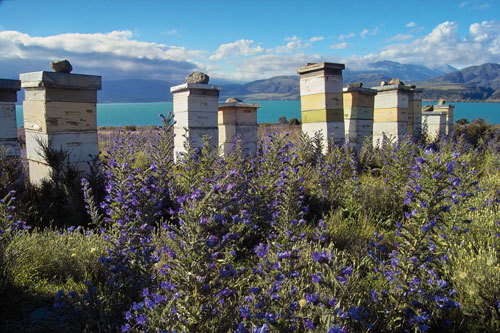Peter Bray is managing director of Airborne Honey, New Zealand’s oldest honey brand and one of the country’s biggest honey exporters. He shares his thoughts on the current issues facing our honey exports.
EXP: What do you think are the key lessons all New Zealand exporters should take from the recent (mis)handling of the Fonterra contamination crisis and the subsequent fallout?
PETER: The use of PR and coordinating responses to this type of event are important. There was a focus on New Zealand honey on the back of the Fonterra event that had its genesis in one faction’s own self-promotional PR activities. Restraint in such a climate is important! Additionally the messaging has to be timely, open, honest, clear and unambiguous.
Being in ethical territory at the outset makes this a lot easier.
EXP: In regard to international perceptions of New Zealand produced manuka honey – what needs to be done to safeguard our reputation going forward?
PETER: We have to develop standards for manuka honey to stop the claims of fraud and misrepresentation being thrown around. We have to use the Codex Alimentarius honey standard’s principles, which means making measurements in three required categories.
(Codex is the international food standards established by the World Health Organisation and the Food and Agriculture Organisation of the United Nations. Most countries, including New Zealand are signatories and the EU adheres to the standards.
Visit www.codexalimentarius.org/)
EXP: What sort of damage control has Airborne Honey had to engage in as a result of the adverse publicity offshore?
PETER: We have reinforced our messages that we use internationally recognised processes to ensure all our product is the best it can be. This is applying the Codex honey standard. Stating this implementation of best practise helps to reassure our customers that Airborne is a brand from a 100-plus year-old family company that can be trusted.
EXP: What do you see as the key concerns surrounding New Zealand’s manuka honey export production and the industry overall? What needs to be done to resolve these issues?
PETER: The key concern is that the World Codex standard requires “wholly or mainly” (a concept in line with common sense consumer expectation) for a honey to be from a named source and that this has to be established by measuring three categories.
Almost all the active manuka being sold has only one substance measured. This substance is known to vary in the plant, change substantially over time and eventually disappear, so can give absolutely no assurance of “wholly or mainly”. A blend of honey can have 20 percent manuka (clearly not “wholly or mainly”) and still have significant levels of the chemical attributed with the activity.
EXP: Briefly explain how Airborne Honey has positioned and protected itself in the honey export market.
PETER: Airborne has adopted the HUT message – which stands for “Honest”, “Undamaged” and “Traceable”. We measure everything to ensure our products are everything they claim to be – all incoming honey and all outgoing product. Last year, our laboratory received 1,374 samples on which we performed 8,114 analyses and recorded 11,119 measurements.
We are transparent with everything we do and can trace a batch of honey from a product batch code right back to each apiary site in New Zealand that it came from. Send us a batch number and we can deliver you a map of the apiaries for that batch.
EXP: What, for you, have been the most satisfying export milestones for Airborne in recent times?
PETER: We think any long term repeat business is the ultimate success. It’s fine to get a new customer or a new country underway But what we actually want to see is repeat sales of product from shelves in stores. Only when we see that can we feel satisfied.
EXP: Why does Airborne have so much success in Asian export markets in particular?
PETER: Our products are seen as safe, consistent and quality and in Asia those values give a large advantage. Being a 100 year-old family company also strikes a chord with our Asian customers where traditions and family values feature more in their culture than ours.
EXP: What advice can you share with other food or beverage exporters regarding breaking into Asian markets?
PETER: Leverage off New Zealand’s reputation for honesty, integrity and quality. Don’t cut corners and stand by your product 100 percent. Remember, honey is a very mature product. Gains are incremental so this is a long term process of years even decades, not months or weeks. Our best customers have been with us for more than 25 years and we select companies with a similar ethic base to us.
EXP: What concerns do you have for New Zealand’s overall honey exports?
PETER: There has been an exponential growth of exports of honey around the manuka market. There are significant growing pains in this sector reflecting on the rest of the honey industry and this will cause many difficulties into the future, the outcomes of which are not predictable.
We have significant concerns that this could impact on New Zealand’s reputation as a supplier of food with integrity.
EXP: What are the export goals for Airborne Honey in the next two to five years? What markets are you focusing on?
PETER: For us, the US and China are our largest growth potentials. The US has long been a successful market for us and we see that growth continuing.
China is a market with immense potential simply because of the scale. If China ate the same amount of honey per person that New Zealanders eat, they would eat 150 percent of total world honey production!




